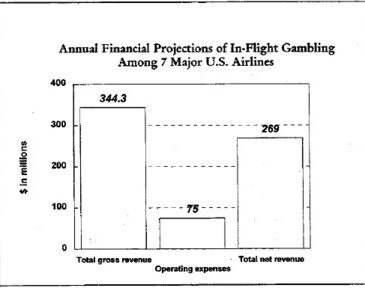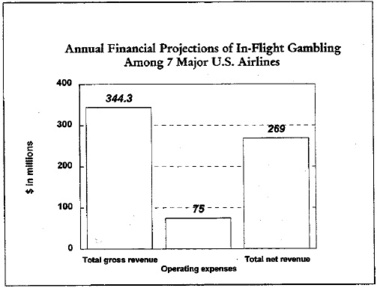Two new and controversial forms of gambling are in-flight gambling and Internet gambling. In-flight gambling allows passengers to have their own monitor and PC on which gambling is one of the several entertainment options. The PCs are linked to a system on the plane which can relay information via satellite to the ground system*. Unlike Internet gambling, which is already up and running and accessible to all internet users with a credit card, in-flight gambling is barred by law on all U.S. air carriers. This ban on in-flight gambling applies to both domestic flights and flights in and out of the U.S. On airlines outside of the U.S. limited in-flight gambling has been available since January 1997. In December 1997, Singapore Airlines will begin offering a full range of electronic casino-style gambling on some of its Boeing 747 flights**. In-flight gambling on Singapore Airlines has built-in parameters; on a single flight, losses will be limited to $350 per credit or debit card and winnings will be capped at $3,500. Despite the ceiling on individual winnings, an airline spokeswoman stated that each 399-passenger jetliner could earn the airlines as much as $1.5 million a year from gambling revenue if only 15% of the passengers used the new machines**. A study conducted by the U.S. Department of Transportation estimated that the total annual gross revenues from in-flight gambling on seven major U.S. airlines would be $344.3 million if the ban was lilted. Subtracting the estimated $75 million of operating expenses, the airlines would net approximately $269 million per year. These estimations are based on various assumptions, including 1) 18% of passengers will gamble, 2) the average wage per play is $1.00, 3) the average time spent gambling per player is 1.7 hours for the Atlantic region and 2.3 hours for the Pacific region. While economics will likely drive the decision about the scope of future in-flight gambling, currently U.S. airlines are legally prevented from implementing gambling opportunities for airline passengers
Sources: *Parets, R.T. (1996, October). Fasten your seat belts. International Gaming& Wagering Business, 17(10), 133-134; **Website: http:lEwww.msnbc.com/news/122789.asp; ***U.S. Department of Transportation. (1996, March). Video gambling in foreign air transportation [Report to the Congress]. Washington D.C.: Author.
This public education project is funded, in part, by The Andrews Foundation





